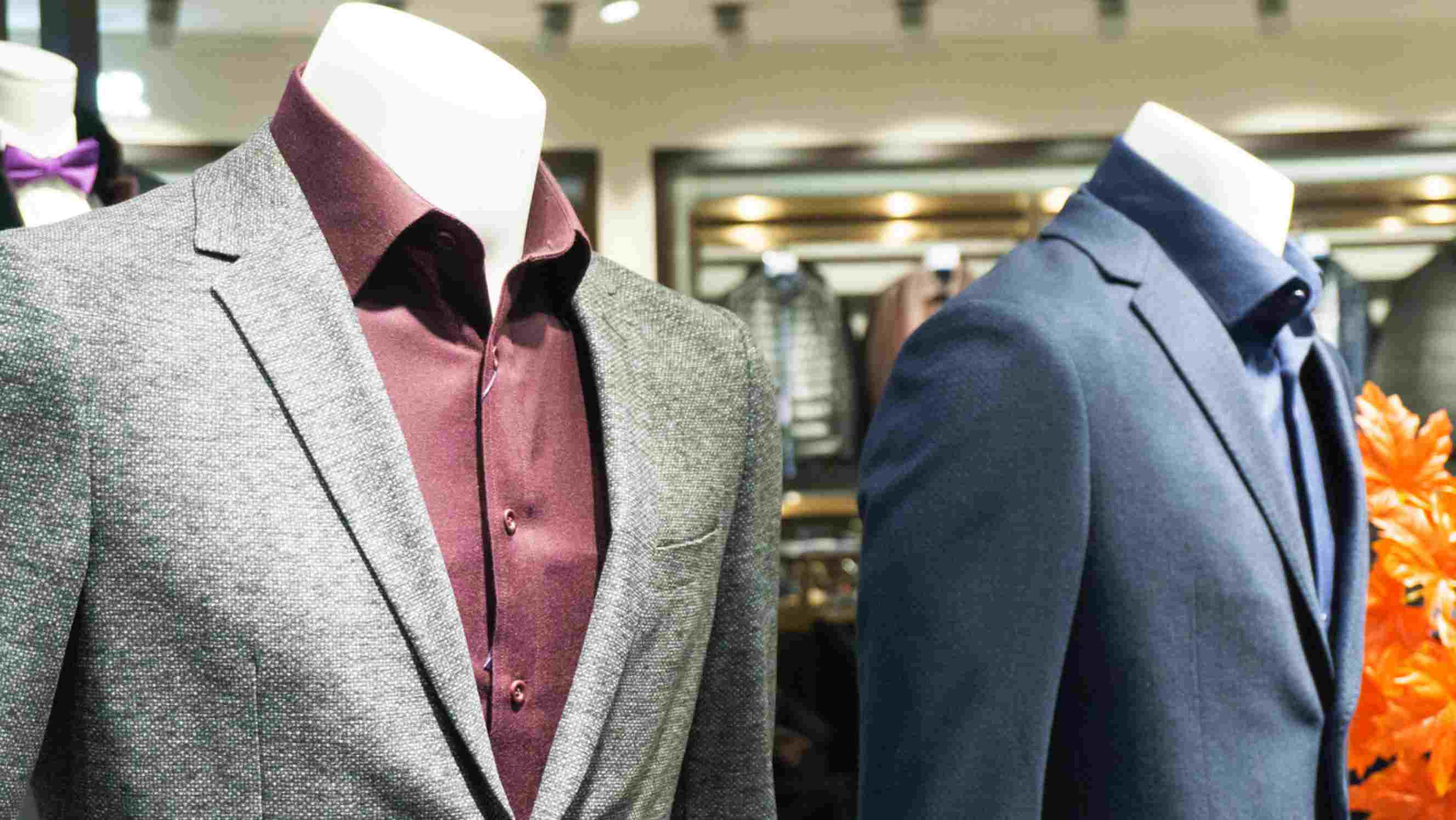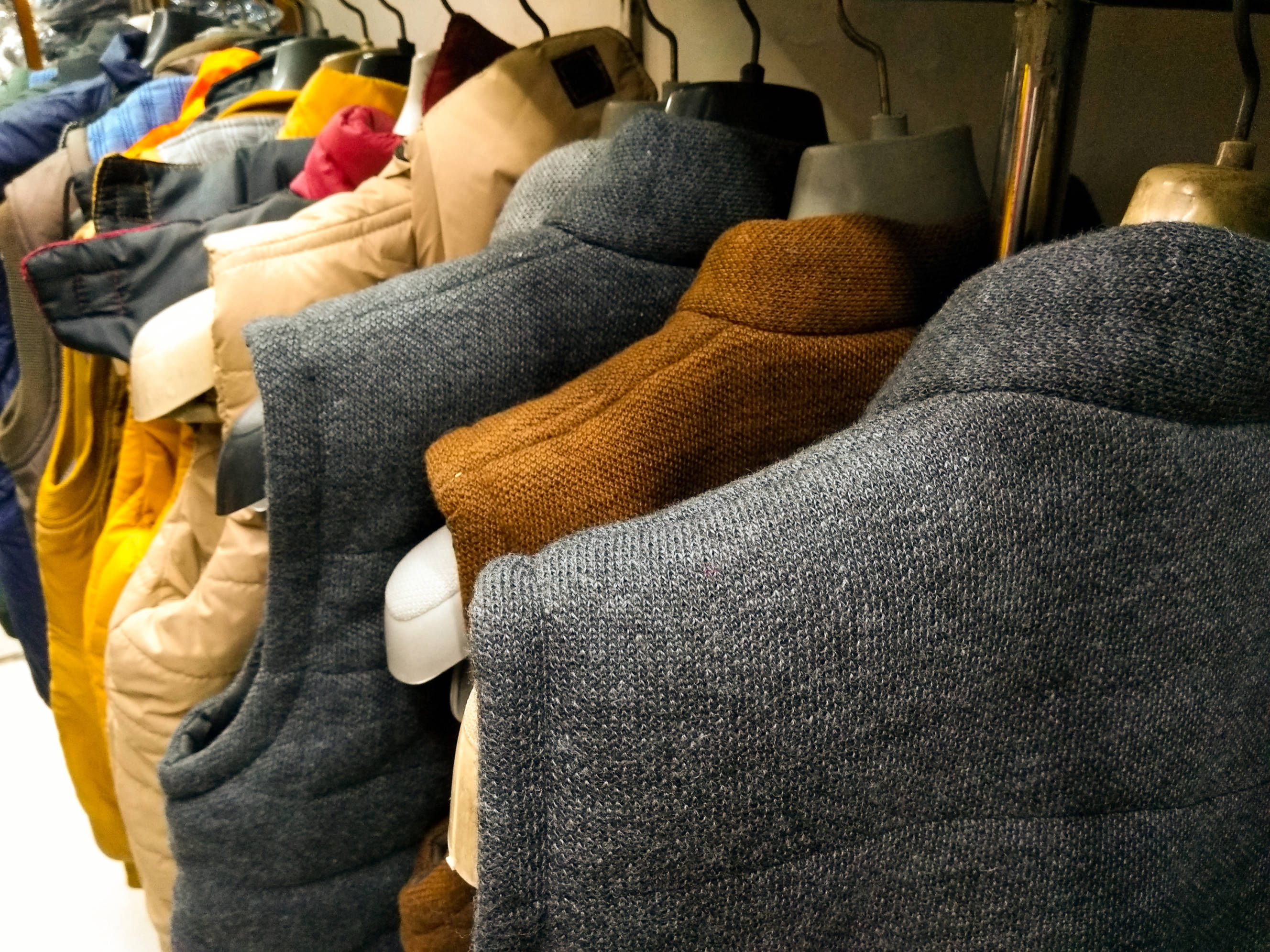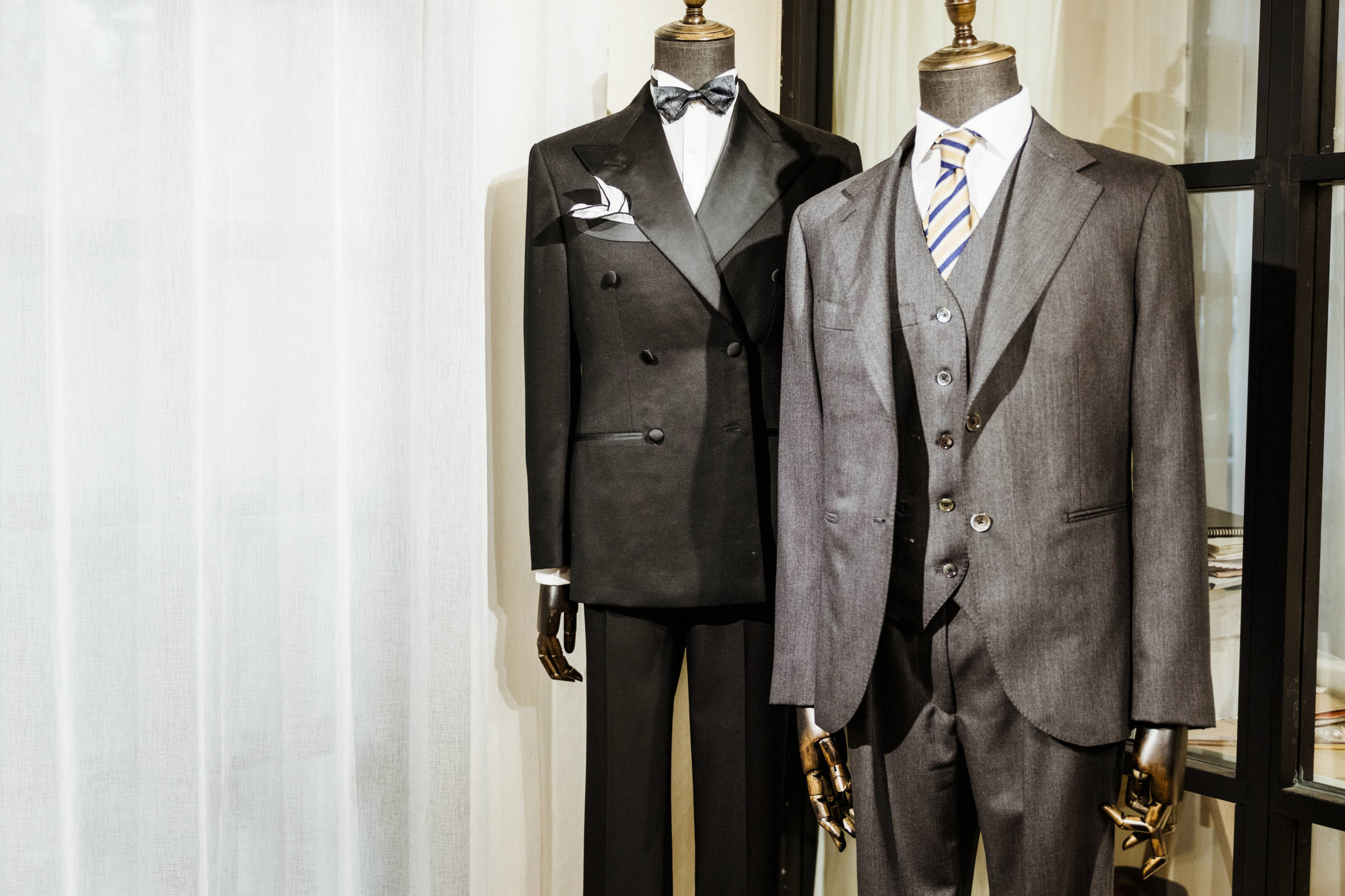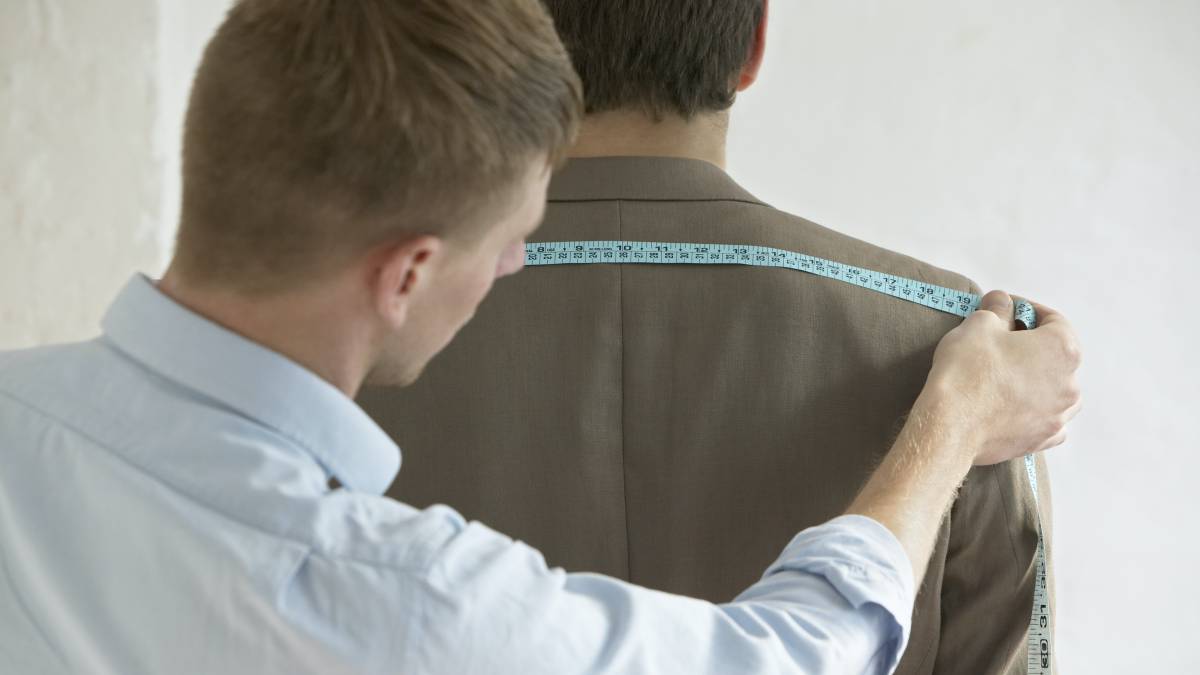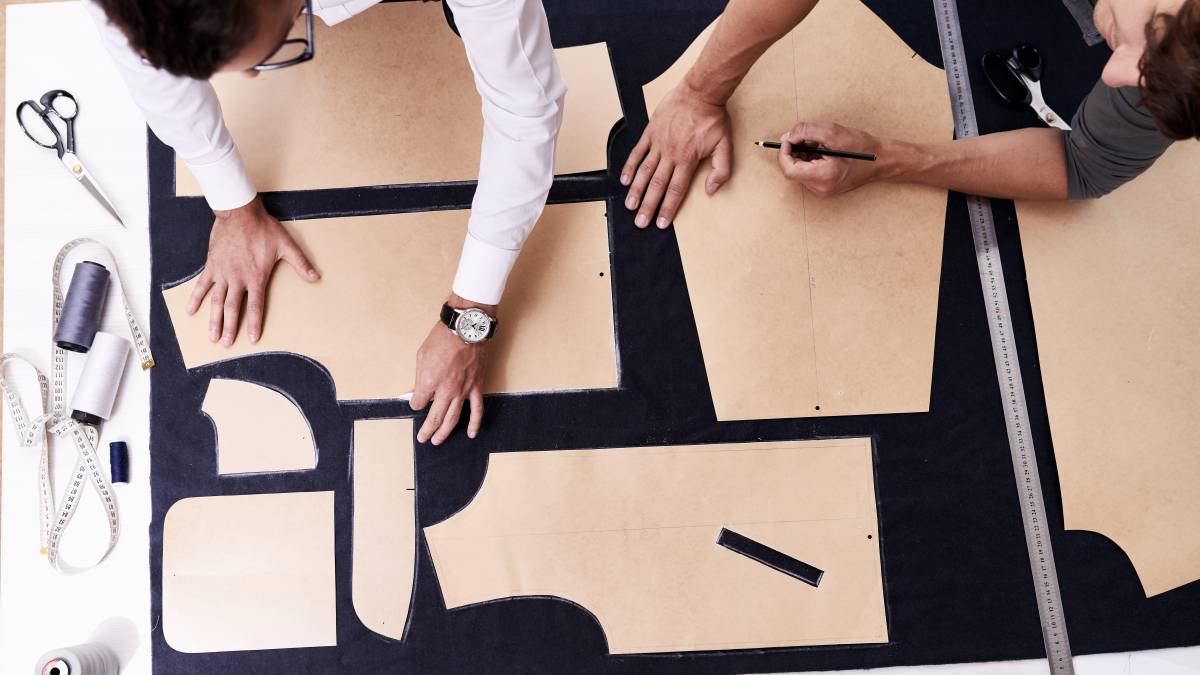- Home/
- Comparisons/
- Tailors/
- Made-to-measure vs Bespoke
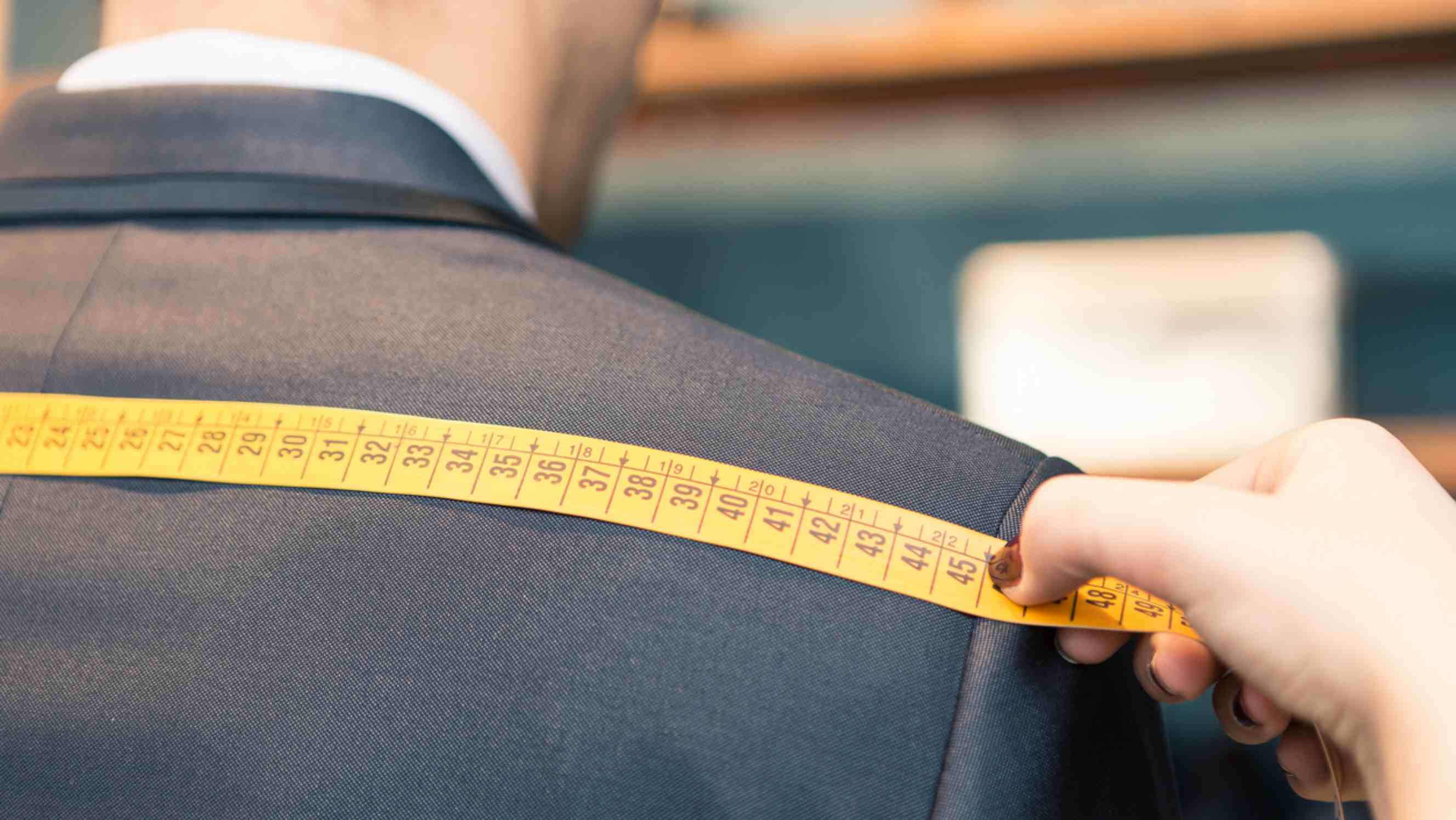
Made-to-measure vs bespoke: Which offers the better fit?
Comparing made-to-measure and bespoke tailoring based on customisation optons, fit, construction, and more.
Hire a tailor near youLast Updated on

Written by Cielo B.
Staff Writer
Read more about our contributor
Key Facts
- Made-to-measure (MTM) tailoring involves modifying standard patterns to fit a customer’s measurements. This allows the customization of details like pockets, buttons, and lining colours, resulting in affordable and personalised garments.
- Bespoke tailoring involves creating custom garments from scratch, involving extensive measurements, multiple fittings, and the use of exclusive fabrics. It allows for complete personalization of every detail, making it the most luxurious and expensive tailoring option.
Formal clothes like suits and tuxedos can be comfortable too! You just have to look for the perfect fit, and you normally won’t find it in off-the-rack clothing. A much better option would be to have them custom-made. But keep in mind that in the world of custom-made garments, not all are created equal since there are made-to-measure (MTM) and bespoke clothing.
Find out how these two custom-made options differ in this made to measure vs bespoke guide to determine which offers a better fit.
What is made-to-measure?
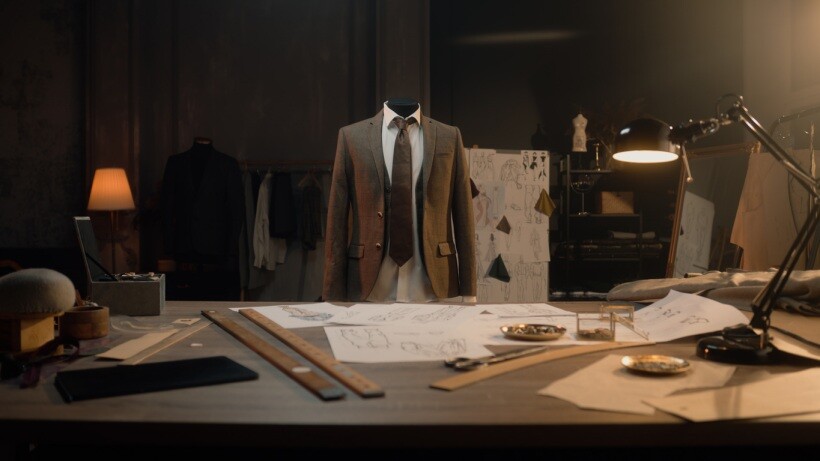
Imagine the standard sizes—small, medium, large, and extra large—when shopping for off-the-rack clothes in boutique shops and malls. The standard sewing patterns are based on those sizes, and the tailor will modify the sewing pattern based on the customer’s measurements. This is how made-to-measure (MTM) or made-to-fit suits and clothes are made.
Since a made-to-measure garment is based on a standard sewing pattern, it’s much more affordable than other custom garment options. Let’s take a made-to-measure suit, as an example. You get to decide about the pocket design, buttons, and lining colours (with the help of the tailor, of course) to make it truly yours for a reasonable price.
What is bespoke tailoring? 
Bespoke tailoring involves making custom-made tailored suits from scratch. From the sewing pattern to the actual construction of the suit, the tailor creates everything from the ground up.
Since bespoke suits require a more meticulous process, tailors must take extensive measurements and do multiple fittings to modify the garment precisely. This allows them to create a pattern design for individuals with asymmetric body figures while achieving a proper fit.
Compared to other tailoring methods, bespoke is the most luxurious option because it uses an extensive range of exclusive and rare fabric options. Moreover, the tailor can alter and personalise every little detail of the bespoke suit, from the lapel style to the stitching details, justifying its high price point.
Bespoke vs made-to-measure: Which tailoring option do you need?
Made-to-measure and bespoke tailoring seem to be good options for men’s and women’s suits, but which one provides a better fit and a flawless look? Keep reading to find out.
In terms of customisation options
Bespoke tailoring offers more customisation options than made-to-measure because the process involves creating a unique sewing pattern from scratch. This provides more design options for the customer, from the lapel design to the smallest details like buttons and buttonholes.
Bespoke tailors would even offer monogramming or the embroidering of a customer’s initials for a more personal touch.
MTM tailoring services also offer customisation, but it’s not as extensive as bespoke. You can ask for a specific pocket design, suit vent and thread colours, but the options are limited. Some MTM tailors could add specialised services like monogramming, but it’s not part of the basic package.
In terms of fit
Bespoke clothes offer a better fit than MTM because bespoke tailoring requires multiple fitting sessions. Often, you may have to go back to the tailor three to five times times, or even more for precise adjustments. This is because capturing your body proportions right is very important for tailors to achieve a perfect fit. This also allows the tailor to customise clothes in the fitting style you want, whether it’s tailored fit or slim fit.
Moreover, since bespoke garments are more customisable than MTM, you may ask to alter the design for a better and more comfortable fit. You can request an additional vent or a split in the back of a suit to give more wiggle room when sitting down. You could also ask for an alteration service to add a lining inside the jacket suit to make it easier to slide on and off.
Although the fit for MTM is more enhanced than regular off-the-rack garments, made-to-fit suits and garments cannot provide a perfect fit for individuals with unique body shapes and unusual postures, especially those who have round shoulders due to frequent hunching. This is because, unlike bespoke tailoring, MTM offers limited customisation.
In terms of fabric selection
Bespoke tailoring is the clear winner when it comes to fabric selection due to having more customisable options. Your choices aren’t limited to a simple collection, as you may choose from an extensive library of fabrics, including rare and unique options from top-tier brands.
Moreover, most bespoke tailors have direct connections and networks to multiple reputable textile mills. Thanks to this, they may easily request direct fabric orders from the mills to cater to their customer’s specific needs.
On the other hand, MTM tailoring caters to a more curated selection of standard fabrics with various colours, patterns and weights. Although also extensive, their fabric collection is more limited since most MTM tailors often get direct orders from one or two reputable textile mills only. They usually don’t have rare fabrics, unlike when ordering a bespoke suit.
In terms of construction

Made-to-measure clothes have a more lax construction process than bespoke ones.
For example, you need a made-to-measure suit. The tailor uses a sewing machine to make the main parts of your suit, such as the jacket, trousers, and waistcoat. Usually, only the accessories and small details, like the patches, buttons, and buttonholes, are hand-sewn. Not to mention, the required number of measurements for MTM suits ranges from 12 to 15, which is less than for bespoke suits.
Meanwhile, bespoke suits require a more meticulous process since the tailor needs to create a unique pattern from scratch, and most parts are hand-sewn. Moreover, the tailor also has to take more detailed and numerous measurements, around 25 to 30, to capture your body shape and posture.
In terms of turnaround time
Since bespoke suits require multiple fittings and extensive customization, the turnaround time can take much longer, ranging from 8 weeks to 4 months. Tailors have to create a unique pattern for each customer, so the duration takes longer.
In contrast, MTM is less time-consuming than bespoke because the tailor modifies pre-existing sewing patterns, reducing the time needed for pattern creation and adjustments. Moreover, MTM is often completed with fewer fittings compared to bespoke, so the turnaround time takes between 4 and 8 weeks.
In terms of cost
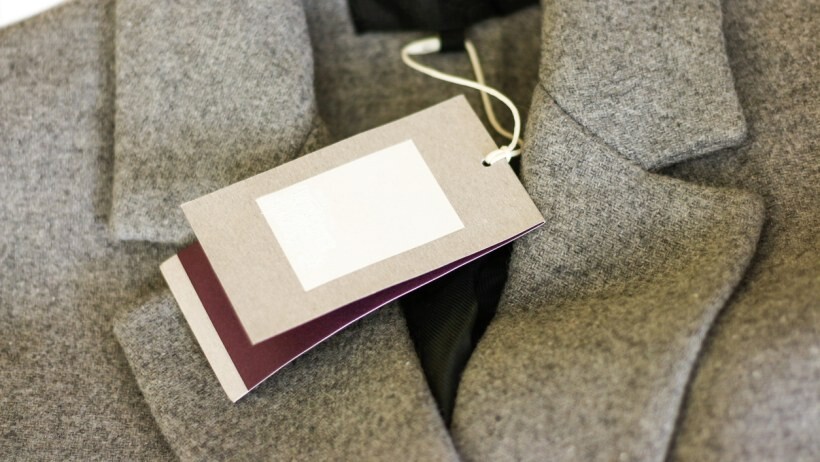
MTM is more affordable than bespoke, and some MTM tailoring brands even offer online services, further lowering costs. However, remember that requesting higher-end fabrics like wool and cashmere and adding more custom features like horn buttons and contrasting details can further increase the suit alteration cost. Still, MTM garments cost less due to limited customisation.
Meanwhile, bespoke garments are more expensive not just because of the extensive handwork and the use of rare and exclusive materials, but also because they usually require multiple fittings, contributing to their higher costs.
Book expert made-to-measure or bespoke tailoring services through Airtasker
Now that you know the differences between MTM and bespoke suits, the last step you need to do is to look for a tailor who can create your dream custom clothing. At Airtasker, you can find talented tailors catering to your specific style and budget.
If you’re still on the fence about investing in custom-made clothing, check out the cost of alterations and tailoring first to see if they fit your budget. Once you’ve decided, post a task, add details like your desired style and outcome, and we’ll help you connect with a tailoring expert.
Learn more about our contributors

Written by Cielo B.
Staff Writer
Cielo is an experienced content writer who has explored various industries throughout her career. Her expertise, founded on a degree in journalism, includes writing about automotive and vehicle maintenance. She’s an avid car enthusiast who loves driving through lush rural areas with her old (but reliable) manual car. Cielo also covers topics like dressmaking, tailoring, and photography since she is a passionate cosplayer who enjoys dressing up as her beloved anime characters.
Made-to-measure vs bespoke tailoring
| Made-to-measure Tailoring |
Bespoke Tailoring | |
| Customisation Options |
Modifies standard patterns; limited customisation options |
Creates unique patterns from scratch; extensive customisation of every detail |
| Fit |
Limited fit for unique body shapes; fewer fittings required |
Superior fit with multiple fittings for precise adjustments |
| Fabric Selection |
Limited to standard fabrics from one or two mills |
Extensive selection, including rare and exclusive fabrics from top-tier brands and mills |
| Construction |
Uses sewing machine for main parts, with some hand-sewn details; requires 12-15 measurements |
Hand-sewn with meticulous construction; unique pattern creation with 25-30 detailed measurements |
| Turnaround Time |
Faster, typically between four to eight weeks |
Longer, ranging from eight weeks to four months |
| Cost |
More affordable due to less customisation and machine-operated construction |
More expensive due to extensive handwork, rare materials, and multiple fittings |
FAQs on made-to-measure and bespoke tailoring
The bespoke measurement method is unique because it doesn’t reference pre-existing sizes. Instead, a seamstress or tailor will create a new sewing pattern based on your body measurements. They will also take into account the style you want while ensuring a perfect fit.
It depends on your priorities and budget. If you often wear a suit and want a suit that is truly unique to you, it’s worth it. Made-to-measure can also be worth investing in if you find most off-the-rack suits unflattering to your body.
Find tailors, fast
Post a task
Related articles
Related price pages
